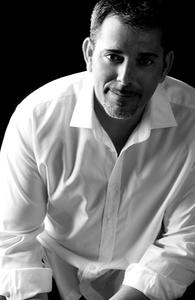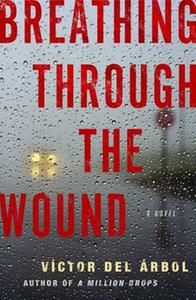 Victor del Árbol was born in Barcelona in 1968 and was an officer of the Catalan police force from 1992 to 2012. As the recipient of the Nadal Prize, the Tiflos Prize, and the first Spanish author to win the Prix du Polar Européen, he has distinguished himself as a notable voice in Spanish literature. His novel A Million Drops was named a Notable Book of the Year by the Washington Post. His newest novel, Breathing Through the Wound, will be published by Other Press on July 7, 2020.
Victor del Árbol was born in Barcelona in 1968 and was an officer of the Catalan police force from 1992 to 2012. As the recipient of the Nadal Prize, the Tiflos Prize, and the first Spanish author to win the Prix du Polar Européen, he has distinguished himself as a notable voice in Spanish literature. His novel A Million Drops was named a Notable Book of the Year by the Washington Post. His newest novel, Breathing Through the Wound, will be published by Other Press on July 7, 2020.
On your nightstand now:
I use my nightstand to keep books I cannot carry with me because of their weights. In this moment, there is A Treatise on Colour by Nicolas de Staël, who is one of my favourite painters. The tragic and wonderful life of this French painter of Russian heritage always fascinated me, as did his absolute dedication to the world of colors. Staël wrote that "landscape is only a state of the spirit." Without a personal view, no landscape can exist.
Favourite book when you were a child:
White Fang by Jack London. It was a gift from my paternal uncle. He was the only one who deeply realized my passion for reading. I used to dream I would become an adventurer, and I wanted to be as free as the main character of the novel: the wolf. Jack London taught me that I could not tell the future, since things always go in their own way, whatever the reason. Therefore, I learned to fight in order to build my own destiny, instead of waiting for things to happen.
Your top authors:
I do not focus on authors' work itself, since it is always different. Rather, I care about how they impact the culture and thinking of their time. That's why my top authors are: Albert Camus, Fyodor Dostoevsky, Gabriel García Márquez, and John Steinbeck. All of them have all the artistic qualities and ethical principles I would like to represent in my work, and in my own life, too.
Book you've faked reading:
I never felt a particular emotional tie with the postmodernist novel, nor with the surrealist avant-garde. Ulysses by James Joyce is especially hard for me to accept, and I do not love some of the short stories by Borges.
 Book you're an evangelist for:
Book you're an evangelist for:
The book I used to give as a present and recommend, my favourite book, is The Stranger by Albert Camus. It teaches us that people need something to believe in, in order not to sink into darkness and despair. Without a purpose, people cannot find any meaning in life.
Book you've bought for the cover:
A very old edition of Decameron by Giovanni Boccaccio. I found it in a bookstore selling old books in Milan. I was attracted to its fun and provocative engraving.
Book you hid from your parents:
Opus Pistorum by Henry Miller. Pure erotic literature, a path through those perversions everyone speaks about in their private spheres, but no one would dare to confess in public. My parents didn't know what the book was about. Anyway, to maintain some sort of decency, I didn't read it when they were around. Actually, I was afraid of their possible questions.
Book that changed your life:
Doubtless Don Quixote of La Mancha by Miguel de Cervantes. It represents an incessant coming and going between reality and fiction. It is the keystone of the Spanish literature. Miguel de Cervantes goes beyond the knightly novel by defining his book as "son of understanding." It allows readers to feel like this is a pretty new book, even today.
Favourite line from a book:
"The mind is its own place, and in itself can make a heaven of hell, or a hell of heaven." This sentence appears in Paradise Lost, one of the greatest poems by John Milton.
Five books you'll never part with:
A book titled Requiem for a Spanish Peasant by Ramón J. Sender. It was my first literary "prize" when I was 14.
Writing Is Living by José Luis Sampedro is my literary bible.
Rayuela by Cortázar: I bought it when I was 19, lived in Paris and dreamt of becoming a writer.
An illustrated edition of Othello by William Shakespeare
Finally, El Romancero Gitano by Federico García Lorca. This one reminds me of the very first time I read García Lorca in Granada.
Book you most want to read again for the first time:
I would love to read again for the first time One Hundred Years of Solitude by Gabriel García Márquez to feel again, for the first time, that the wonder was blooming in my heart. To feel once again all the mysteries of life in my hand. "He didn't really care about death, but about life, and so the feeling he felt when he pronounced the sentence was not a feeling of fear, but of nostalgia."

